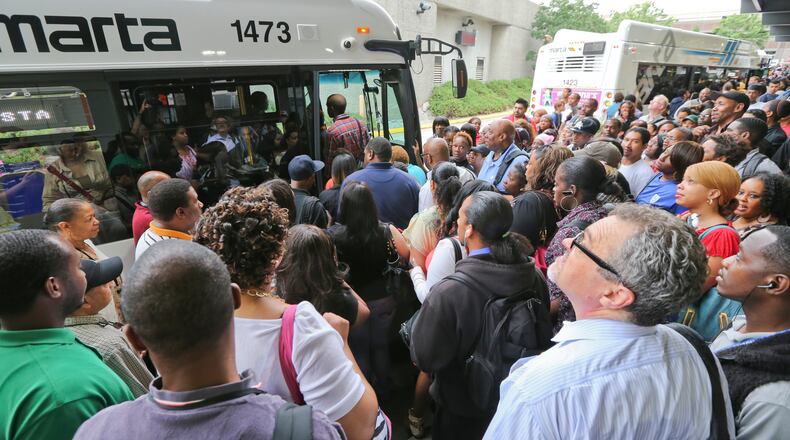WHAT DOES CLAYTON COUNTY GET FOR A 1-CENT SALES TAX?
BUS:
The local bus service should begin by March 2015 and include local buses, flex buses (circulator buses that deviate from a normal route when requested) and paratransit service, if all goes as planned. The bus network would eventually include eight, fixed routes, six of which would be in place by 2016 with the final two to start by 2020. There would be five transfer centers in Mountain View, Fort Gillem, Morrow and Riverdale and at the Harold R. Banke Justice Center. A sixth may be developed in Lovejoy by 2020.
RAIL/HIGH-CAPACITY TRANSIT DETAILS:
MARTA will either provide commuter rail service or some other high-capacity transit option, such as bus rapid transit. There are two rail alternatives: One would involve passenger trains running on the same tracks as Norfolk Southern freight trains; the other would require construction of a separate track adjacent to Norfolk Southern freight tracks. Both rail options require Norfolk Southern to lease access to its corridor to MARTA, and it’s uncertain whether the railroad will consent. The alignment of the route generally begins at the East Point MARTA station and extends south to Clayton State University, where it continues through the Morrow/Southlake area on to Jonesboro. Potential rail station locations would be at East Point, Hapeville, Mountain View/Airport, Forest Park/Fort Gillem, Clayton State University, Morrow/Southlake Mall and Jonesboro. It is envisioned that passenger rail service could begin in 2022.
Source: Clayton County Comprehensive Transit Plan, prepared by MARTA
Supporters of a referendum that would expand MARTA to Clayton County were jubilant Tuesday after returns throughout the night showed the measure passing by a wide margin.
Pro-transit advocates declared victory at the Friends of Clayton Transit election watch party at Riverdale Town Center, where a crowd of more than 100 volunteers, organizers, politicians and MARTA officials gathered in the ballroom and noshed on finger foods.
Clayton, if results hold, will become the first new county to add MARTA since the agency began operating in DeKalb and Fulton in 1971. Some said they hoped that strong voter approval would be a potential bellwether for the Atlanta region’s shifting attitude toward MARTA. Atlanta Mayor Kasim Reed, a key supporter of the referendum, also made an appearance at the celebration.
“People recognized the opportunity to increase travel options was something they wanted to say yes to,” said Colleen Kiernan, director of the Sierra Club’s Georgia Chapter.
Of metro Atlanta’s five core counties, Clayton is the only one that lacks a local public transit system. A county-operated bus system, C-Tran, was dissolved in 2010 due to lack of funds. Supporters have been going door-to-door campaigning since July. MARTA supporters hope the transit line will spur economic development and revitalization.
“I think this will be a great opportunity for the citizens of Clayton and MARTA to join together in a historic partnership,” MARTA CEO Keith Parker said.
Organized opposition to the referendum never materialized. However, individuals who voiced opposition cited fears that raising the sales tax could drive away business and that bringing MARTA service to Clayton could usher in more crime.
» INTERACTIVE MAP: MARTA's planned stops
» TIMELINE: Key dates in the Clayton vote on MARTA
» FLASHBACK FOTOS: MARTA rail in Atlanta
The vote means Clayton’s sales tax will rise from 7 percent to 8 percent, starting in March. The MARTA tax is expected to generate proceeds of about $45 million per year.
Half the money will finance limited bus service starting in March and full bus service the following year. The other half will be set aside for a future commuter rail or a comparable form of high-capacity service (such as bus rapid transit).
“This means hope for the young people who want summer jobs but can’t get to them,” said Friends of Clayton Transit founder Roberta Abdul-Salaam. “It means independence for senior citizens who feel trapped. It means opportunities for businesses that have been dependent on foot traffic. It puts the county at a stronger position regionally.”
MARTA will holding public hearings in December to get input from the community on the location of bus routes and stops.
Two of the three MARTA jurisdictions — Atlanta, Fulton and DeKalb — still have to approve the deal before it can be finalized.
MARTA Board Chairman Robbie Ashe said that the transit agency’s sights are now set on making sure they deliver first-class service to Clayton County.
“Tonight’s the night to celebrate,” Ashe said. “Tomorrow, the hard work starts.”
About the Author
The Latest
Featured


